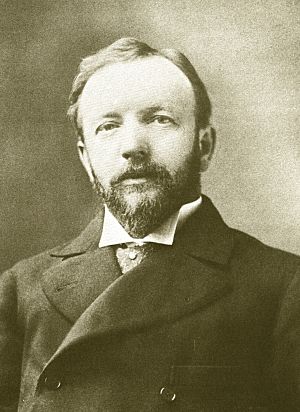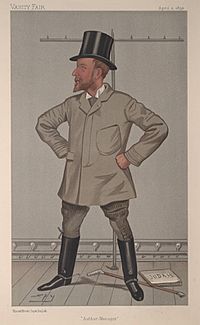Henry Arthur Jones facts for kids
Quick facts for kids
Henry Arthur Jones
|
|
|---|---|
 |
|
| Born | 20 September 1851 Granborough, Buckinghamshire, England
|
| Died | 7 January 1929 (aged 77) |
| Occupation | Dramatist |
| Signature | |
Henry Arthur Jones (born September 20, 1851 – died January 7, 1929) was an English playwright. He became famous for his play The Silver King in 1882. He wrote many plays, often showing ideas that were different from those of Henrik Ibsen, a famous Norwegian playwright. Jones held more traditional or "conservative" views. He often debated with writers who had more modern or "liberal" ideas, like George Bernard Shaw and H.G. Wells.
Contents
About Henry Arthur Jones
Henry Arthur Jones was born in Granborough, Buckinghamshire, England. His father, Silvanus Jones, was a farmer. Henry went to Grace's Classical and Commercial Academy in Winslow until he was 13 years old. He started working at a young age. In his free time, he enjoyed reading and writing.
His Career as a Playwright
Jones was 27 when his first play, It's Only Round the Corner, was performed in 1878. Just four years later, he had a huge success with The Silver King (1882). He wrote this play with Henry Herman. It was a very popular play that made a lot of money. This success allowed Jones to write plays that he truly wanted to write.
His play Saints and Sinners (1884) was also very popular, running for 200 nights. This play showed what life was like for middle-class people in a small town. It also included religious themes, which caused some discussion at the time. Jones defended his play in an article.
Other important plays that made him famous include The Middleman (1889) and Judah (1890). His plays were performed many times on Broadway in New York City. The last one was Mrs Dane's Defence in 1928.
In 1891, his plays started to be published in a special collection. He also shared his ideas about theater in lectures and essays. These were later put together in a book called The Renaissance of the English Drama (1895). He also wrote essays about being patriotic and about education. In the 1920s, he wrote strong political articles, which you can read more about below.
List of His Plays
- It's Only Round the Corner (1878)
- Hearts of Oak (1879, later called Honour Bright)
- Elopement (1879)
- A Clerical Error (1879)
- An Old Master (1879)
- His Wife (1881)
- Cherry Ripe (1881)
- Home Again (1881)
- A Bed of Roses (1882)
- The Silver King (1882, with Henry Herman)
- Breaking a Butterfly (1884, with Henry Herman)
- Chatterton (1884, with Henry Herman)
- Saints and Sinners (1884)
- Hoodman Blind (1885, with Wilson Barrett)
- The Lord Harry (1886, with Wilson Barrett)
- The Noble Vagabond (1886)
- Hard Hit (1887)
- Heart of Hearts (1887)
- Wealth (1889)
- The Middleman (1889)
- Judah (1890)
- Sweet Will (1890)
- The Deacon (1890)
- The Dancing Girl (1891)
- The Crusaders (1891)
- The Bauble Shop (1893)
- The Tempter (1893)
- The Masqueraders (1894)
- The Case of Rebellious Susan (1894)
- The Triumph of the Philistines (1895)
- Michael and his Lost Angel (1896)
- The Rogue's Comedy (1896)
- The Physician (1897)
- The Liars (1897)
- The Manoeuvres of Jane (1898)
- Carnac Sahib (1899)
- The Lackeys' Carnival (1900)
- Mrs Dane's Defence (1900)
- The Princess's Nose (1902)
- Chance the Idol (1902)
- Whitewashing Julia (1903)
- Joseph Entangled (1904)
- The Chevalier (1904)
- The Hypocrites (1906 New York, 1907 London)
- The Lie (1915)
- The Ogre (1911)
- The Divine Gift (1913)
- Mary Goes First (1913)
- The Lie (1914)
- Cock o' the Walk (1915)
- The Pacifists (1917)
What People Thought of His Plays
During His Life
The famous writer Oscar Wilde once joked about Henry Arthur Jones's writing style. He said, "There are three rules for writing plays... The first rule is not to write like Henry Arthur Jones." Wilde was known for being witty and often made fun of how people acted. Jones, on the other hand, tried to show real life in his plays, often pointing out people's mistakes and weaknesses.
Later Views
Even though Henry Arthur Jones wrote about similar topics and in a realistic style like Henrik Ibsen, he is not as well-known today. One reason is that Jones's characters often seemed simpler. They didn't always have the deep thoughts and feelings that Ibsen's characters did. Also, Jones had more traditional views, while Ibsen was more open to new ideas.
However, some of Jones's plays, like The Hypocrites, The Lie, and Mrs Dane's Defence, are very well-made. They have exciting scenes and a strong story. His plays often show everyday people dealing with love and relationships. Men in his plays sometimes seem selfish or stubborn, but also brave. Women often seem scared of what society might think, but they are usually loyal and caring.
In many of his plays, there is a wise male character who explains everything at the end. Their ideas are usually not questioned. For example, in The Case of Rebellious Susan, a character tells a woman who supports women's rights to go home. He says women have a great future as wives and mothers, but not much in other roles. Sometimes, a character in his plays will disagree with everyone else, like Mr. Linnell in The Hypocrites. This play is about the struggle between religious beliefs and money.
His Thoughts on Other Plays
When he was older, Henry Arthur Jones made a funny comment about Ibsen's play A Doll's House. He said it should have ended with the husband drinking whisky and saying, "Thank God I'm well rid of her." This shows his traditional views on marriage and women's roles.
His Political Writings
Later in his life, Henry Arthur Jones wrote many articles about politics. He often argued against the ideas of writers like H.G. Wells and George Bernard Shaw. Jones was against Communism and the Soviet Union.
One of his works was My Dear Wells: a Manual for Haters of England (1921). This book was a collection of letters he wrote to H.G. Wells. In one letter, Jones criticized Wells for not fully supporting communism, even though Wells seemed to admire the people who brought it to Russia.
H.G. Wells usually chose not to respond to Jones's arguments. In a letter to The New York Times in 1921, Wells said that Jones was like a "tiresome, remote and inattentive foghorn." He felt that Jones didn't truly understand his writings.
Jones also wrote a strong response to George Bernard Shaw's anti-war article. He used very colorful language to describe Shaw, calling him a "freakish homunculus" born of "Sedition" and "Perversity."
His Family Life
Henry Arthur Jones married Jane Eliza Seeley in 1875. They had six children together:
- Winifred Amy (1880–1956)
- Ethelwyne Sylvia (1883–1948), who became an actress.
- Gertrude (Jill) Mary (1884–1967)
- Jenny Doris Thorne (1888-1947), who wrote a book about her father's life.
- Lucien David Silvanus (1894–1947)
- Oliver Stacey Arthur (1899–1977)
Images for kids
See also
 In Spanish: Henry Arthur Jones para niños
In Spanish: Henry Arthur Jones para niños
 | Claudette Colvin |
 | Myrlie Evers-Williams |
 | Alberta Odell Jones |



